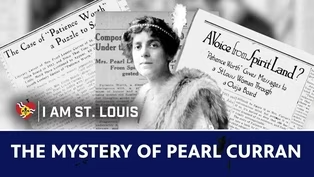Living St. Louis
How Senators John Danforth and Thomas Eagleton Worked Across Party Lines
Clip: Season 2025 Episode 21 | 12m 43sVideo has Closed Captions
Former Missouri senators Thomas Eagleton and John Danforth forged an enduring friendship.
Former Missouri senators Thomas Eagleton, a Democrat, and John Danforth, a Republican, forged an unlikely but enduring friendship during their years in the U.S. Senate.
Problems playing video? | Closed Captioning Feedback
Problems playing video? | Closed Captioning Feedback
Living St. Louis is a local public television program presented by Nine PBS
Support for Living St. Louis is provided by the Betsy & Thomas Patterson Foundation.
Living St. Louis
How Senators John Danforth and Thomas Eagleton Worked Across Party Lines
Clip: Season 2025 Episode 21 | 12m 43sVideo has Closed Captions
Former Missouri senators Thomas Eagleton, a Democrat, and John Danforth, a Republican, forged an unlikely but enduring friendship during their years in the U.S. Senate.
Problems playing video? | Closed Captioning Feedback
How to Watch Living St. Louis
Living St. Louis is available to stream on pbs.org and the free PBS App, available on iPhone, Apple TV, Android TV, Android smartphones, Amazon Fire TV, Amazon Fire Tablet, Roku, Samsung Smart TV, and Vizio.
Providing Support for PBS.org
Learn Moreabout PBS online sponsorshipIn today's political climate, it can sometimes seem like Republicans and Democrats will never get along.
But there was a time in the not too distant past when two senators, one Republican and one Democrat, didn't just work well together, but were actually friends.
- Right now, you look at, just look at pictures of people today active in politics, they all look mean.
And it was the opposite of that, there was absolutely none of that.
- [Veronica] That's former Republican senator from Missouri, John Danforth.
From 1976 to '87, Danforth had a close working relationship and a friendship with his senior senator, Thomas Eagleton.
Despite their differing political beliefs, the two actually had a lot in common.
The State Historical Society in Columbia, Missouri, currently has an exhibit about their relationship, which is open until the end of the year.
But before we talk about them together, let me introduce them individually.
Thomas Eagleton was born in 1929.
- He was born into a family that was pretty well connected in St.
Louis, not perhaps as well as Danforth, but still very well connected.
He attends Country Day School in St.
Louis.
- [Veronica] Sean Rost is the assistant director for research at the State Historical Society.
He says Eagleton experienced a quick rise through Missouri politics, becoming St.
Louis Circuit Attorney in 1956, and Missouri Attorney General in 1960.
- I met Thomas Eagleton when he was the Attorney General.
It was probably late '61 or '62.
- [Veronica] That's U.S.
District Senior Judge Edward Filippine.
He was appointed by President Jimmy Carter.
At 95 years old, he's currently inactive.
In 1964, Eagleton asked Filippine to run his campaign for Missouri Lieutenant Governor.
- And that came as a shock to me because this was a statewide campaign.
I had done some work in townships and county, but never really participated in a statewide campaign.
That was the start of our long political relationship and our lifelong friendship.
- [Veronica] In 1968, Thomas Eagleton ran for U.S.
Senate for the first time.
- [Sean] Eagleton essentially pushes aside the incumbent, Edward V. Long.
He wins, and then he wins a very narrow election against Tom Curtis, who was a Republican from St.
Louis as well.
He's being suggested as a possible running mate for George McGovern in that election of 1972.
- [Veronica] And though Eagleton wasn't McGovern's first choice, he was picked as his running mate on July 14th, 1972.
- So there was a lot of support for that.
Eagleton was seen as being a very popular senator.
- [Veronica] But his vice presidential run was short-lived.
- Due to controversies and questions about his mental health and prior treatments for depression, and particularly shock therapy in the 1950s and '60s, there was a stigma attached to that.
And so McGovern's backers were kind of pushing him to drop Eagleton from the ticket, which he ultimately convinced Eagleton to do.
- [Veronica] His candidacy lasted about 18 days.
The exact source who leaked the information is still unknown.
- [Sean] He felt he had gotten past it, and that was where he was kind of standing on the issue, was that he didn't feel like he needed to disclose it because it was not something that was presently afflicting him, in his mind.
- [Veronica] John Danforth didn't know Eagleton well at that time, but he says most of the people in Missouri fully supported Eagleton during the ordeal.
- I mean, the reaction in our state was highly favorable to Tom Eagleton.
I mean, he was viewed as sort of the champion of the people during that.
It's not, it's a terrible thing to see somebody go through something like that.
- [Veronica] But besides being dropped from the presidential ticket, Eagleton's career wasn't really hurt by the controversy.
In fact, he remained a U.S.
Senator for 15 years, and in 1974, he was joined by John Danforth.
- [Sean] And he comes from a very prestigious family.
He is the grandson of the founder of Ralston Purina in the city of St.
Louis.
- When I was about 10 years old, our parents took my brother Don and me to Washington to see the sights.
And we sat in the Senate Gallery and I looked down and I said to myself, "I'd like to do that someday."
And I also remember verbatim what my dad said as we were filing out of the Senate Gallery, which was, "What a bunch of windbags."
So that's from a very early age, I was interested in politics.
- [Veronica] In 1968, Danforth was elected as Missouri's Attorney General, the first Republican to hold that office in 40 years.
- But he's attributed in a lot of ways of starting a Republican revival in the state of Missouri.
Almost immediately afterwards, his office of Attorney General becomes the launching point of many different careers.
- [Veronica] Danforth first met Eagleton that same year.
- He reached out to me and said, "You know, would you like to visit about the AG's office?"
Which I did.
And he told me about it, what it was like in his day and some of the people who were still in the office and his views of how they were and what they were doing.
- [Veronica] Danforth was sworn in to the U.S.
Senate in 1977.
After the ceremony, he and his family got together for dinner and invited his fellow Senator, Thomas Eagleton, and his wife, Barbara.
- I do remember that during that dinner, Tom turned to me and said, "I know you wish your father was still alive."
What that said to me is, "I see you as a person."
You know, "I see you as a person whose father died just a few years ago.
My father died, and that's how I see you, not as a senator, but I see you as a human being."
And that set the tone for our relationship, which existed throughout our time in the Senate together, and in fact, until the day of his death.
His views were different than mine, but it was so much fun.
You know, really, when politics works, it should be fun and there should be humor in it.
He was a very funny man.
- Jack Danforth's family was Purina, and they had Dog Chow.
And so he had seen an ad for Dog Chow.
So he wrote Jack, "Dear Jack," scribbled this note, "I just saw an ad for Dog Chow, and they said it's good for the dog's hips.
Now, my dog, Pumpkin Eagleton, has been taking Dog Chow for a long time.
Her hips are just wonderful.
In fact, they're so good, I started to take it myself."
- There were folders that were nothing but barbs going back and forth between Danforth and Eagleton, you know, just ribbing each other about something.
So we wanted to do a whole panel just on that.
- [Veronica] Laura Jolly is the assistant director for manuscripts at the State Historical Society.
She read me one of the notes Eagleton wrote to Danforth about the junior senator's vote to ratify the Panama Canal Treaty in '78.
- You know, this is just typical Eagleton.
"Danforth, will you please stop voting the way you do?
I simply followed your lead on Panama, and look at the trouble you've gotten me into."
(laughs) - [Veronica] The treaty would give the canal to Panama by the year 2000.
- Early in the process, I announced I'm gonna vote for the treaties.
He thought that was so funny.
And he was, so he, he called me for a while, Panama Jack.
That was what he called me.
- [Veronica] But they took their political relationship seriously.
And though they often voted differently, one thing they did agree on was the welfare of Missouri.
- They were always willing to keep their door open for one another to kind of have that conversation about what's in the best interest for Missourians, but also how do we feel it when we address it through our conscience as well.
The Meramec Basin Project was one of the initial ones where they were split, and then Danforth and Eagleton came together to decide the idea of a referendum.
They supported the idea of keeping the St.
Louis Airport in the city of St.
Louis, or I guess I should say, in the county of St.
Louis.
- [Veronica] They often agreed on conservation in Missouri.
Both supported creating a preserve called the Irish Wilderness in Oregon County.
- Another one, a big one, is gonna be kind of updating the lock system on the Mississippi River.
They were both in support of updating those lock systems and addressing that as well.
I think in a lot of ways, you know, the legacy of them is not just simply built in concrete, you know, the locks and dams on the Mississippi River or even the Eagleton Courthouse.
But you know, the legacy of that bipartisanship, you know, really influenced Missouri politics going forward.
I think in a lot of ways is, you know, we could think about so many political leaders of more recent eras who served as campaign staff or aides to both of them, you know, or either of them, who put them on a course to impact Missouri politics later on.
- [Veronica] Eagleton retired from politics in 1987, but the two remained close.
- You know, we were Cardinals fans.
We'd go to the ballpark together.
He called Beffa's, which is a restaurant on Olive, I guess, and he called it his club.
So we'd go to have lunch at Beffa's and just chat and about whatever and about politics and, oh, disagreement.
- [Veronica] While Danforth remained a Senator, Eagleton became a professor at Washington University and advocated for bringing the Rams NFL team to St.
Louis.
In 1994, both Eagleton and Danforth were named Men of the Year by the "St.
Louis Post-Dispatch."
The first time two people were ever chosen for the award.
And in the year 2000, St.
Louis's skyline would change in the name of Thomas Eagleton.
In the early nineties, a plan began to build a new courthouse downtown.
Senator Kit Bond reached out to Judge Filippine about the proposal.
- He said, "I want to name the building.
I wanna put a bill in for Tom Eagleton."
And that's how the bill went in, and it just went straight through.
No problem.
- [Veronica] Eagleton, Danforth, and others broke ground on the building in 1994, and it was completed in 2000.
- But that word came back to me that he had talked to some people and see if there was a possibility of a little change.
The bill was already done, and they told him no.
"What do you want to change?"
He said, "I would rather if it was named the Eagleton-Danforth United States Courthouse."
That's how close they had become.
- [Veronica] On March 4th, 2007, Thomas Eagleton died at age 77.
At his memorial service, Danforth delivered a eulogy for his friend, describing what he thinks heaven would be like for Eagleton.
- I imagine a glorified Beffa's.
(members laughing) And Tom is in the middle of things, and all of us are gathered around him, and he's holding forth, as always, giving us his opinions on politics and baseball.
And God willing, I'm there too, present at the banquet, taking in all Tom's words, disagreeing with half of what he says, just as I always did, and loving every bit of it.
That for me would be heaven.
- [Veronica] Danforth hopes everyone, not just other politicians, can learn from their friendship.
- And we see right now that politics breaks up families.
It's the Thanksgiving dinner thing, you know, and people lose friendships.
They all, because they're arguing about politics.
It can't be that way.
We can't let politics do that to us.
So we've gotta be able to conduct politics in a way that's within the structure of friendships.
Great Rivers Greenway Celebrates 25 Years of Connecting St. Louis Through Trails
Video has Closed Captions
Clip: S2025 Ep21 | 6m 28s | Marking 25 years of Great Rivers Greenway. (6m 28s)
The Place Where a Dead Englishwoman Wrote Best-Selling Novels | I Am St. Louis
Video has Closed Captions
Clip: S2025 Ep21 | 1m 35s | Pearl Curran gained national fame for her claims of channeling a medieval spirit. (1m 35s)
Why are Cave-Ins and Sinkholes Popping Up in St. Louis?
Video has Closed Captions
Clip: S2025 Ep21 | 3m 59s | St. Louis has experienced several sinkholes over the past few months. (3m 59s)
Providing Support for PBS.org
Learn Moreabout PBS online sponsorshipSupport for PBS provided by:
Living St. Louis is a local public television program presented by Nine PBS
Support for Living St. Louis is provided by the Betsy & Thomas Patterson Foundation.
















